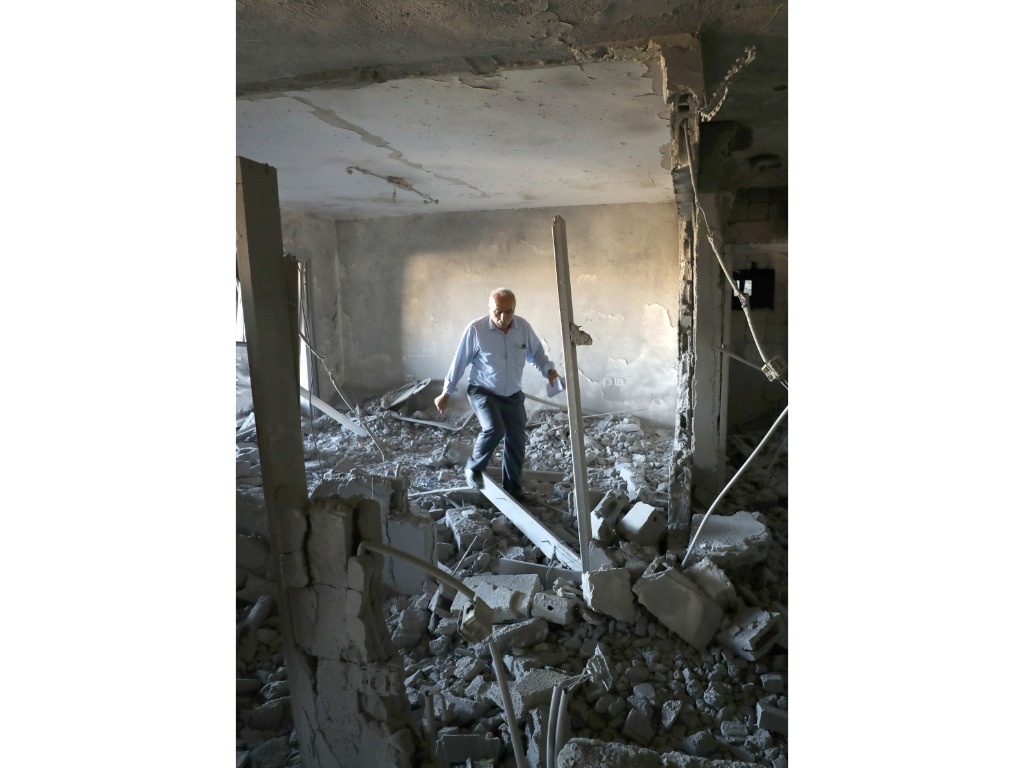Washington. The United States has approved a new arms sale to Israel worth more than $20 billion, including more than 50 fighter jets F-15advanced-range air-to-air missiles and nearly 33,000 high-explosive tank and mortar shells, among other supplies, when Tel Aviv’s war against the Gaza Strip has caused the death of 39,929 Palestinians, mostly civilians, and the death toll is 92,240.
The State Department notified Congress that this sale will enhance Israel’s ability to confront current and future enemy threats.
The Biden administration has managed to support Israel amid calls from lawmakers and social sectors to stop this military sponsorship. In May, the pressure managed to paralyze the shipment of 3,500 bombs to Tel Aviv.
Of all the components included in the package, tank shells would be available almost immediately, while the first aircraft deliveries are planned for 2029.
The new military aid was approved at a time of growing concern that Israel could become involved in a wider war in the Middle East.
Israeli Defense Minister Yoav Gallant thanked Washington for its assistance; as we fight to defend Israel on seven fronts, their message of support and commitment to our security is clear, he wrote in X.
Iran, which has said it is not seeking permission to respond to Israel’s killing of Hamas leader Ismail Haniyeh on its territory, has warned that calls by several Western countries not to retaliate are a sign of support for the Israeli regime to continue committing more crimes in the region.
Iran and its regional allies in Lebanon, Iraq and Yemen have vowed to respond to the July 31 assassination of the Hamas leader, which they accuse Israel of, and to that of the military commander of the Lebanese movement Hezbollah, Fuad Shukr, committed a day earlier in Beirut, the latter of which the Israeli state claims responsibility.
The Islamic Republic is determined to defend its sovereignty and does not seek permission from anyone to exercise its legitimate rights, said Naser Kanani, spokesman for Iran’s Foreign Ministry.
Iran will never bow to pressure, Iranian President Masud Pezeshkian said.
The United States, which has recently stepped up its military presence in the Middle East, said it expected a series of attacks by Iran and its allies this week.
The White House chief of staff, Joe Biden, and the leaders of France, Emmanuel Macron, Germany, Olaf Scholz, Italy, Giorgia Meloni, and Britain, Keir Starmer, warned Iran yesterday of the serious consequences for regional security of an attack.
Fears of a war in the region have led many airlines to suspend flights to several Middle Eastern countries.
Israel is working to eliminate threats and be in a position to strike wherever we choose, Defense Minister Yoav Gallant warned during a visit to a military base on the border with Lebanon.
Tehran is conducting military exercises in the Caspian Sea to strengthen the readiness of its naval contingent, a local official was quoted as saying by the Mehr news agency. This is the second Iranian military exercise in three days.
Biden said yesterday that he expects Iran to suspend its retaliation against Israel if a ceasefire is reached in Gaza. That is my expectation, he said.
However, he admitted that it is becoming very difficult to close a deal for a truce.
President Abdel Fattah al-Sisi of Egypt, Tamim Bin Hamad Thani, the emir of Qatar, and Biden, in his role as mediators, have called for a summit for tomorrow. Hamas has questioned its attendance, and instead demands that the plan launched by the US president in May be fulfilled, without further dialogue or new proposals.
Only a ceasefire agreement in Gaza would prevent Iran from ordering direct retaliation against Israel, three senior Iranian officials were quoted as saying by Reuters and Israeli military radio, among other media.
A senior Iranian security chief told Reuters that Tehran and Hezbollah would launch a direct attack on Israel if talks on a ceasefire in Gaza failed, or if they perceived Tel Aviv to be dragging out negotiations. The sources did not say how long Iran would wait for talks to progress before responding. The account was neither denied nor confirmed by Tehran.
Iran has been in intensive talks with Western countries and the United States in recent days on ways to gauge retaliation for the killings of Haniyeh and Shukr, the sources said, speaking on condition of anonymity.
Hezbollah attacked the Israeli base of Monte Neria last night with a barrage of rockets Katyushaa detachment in Jal Deir, the Israeli base of Meron and the Malkia area in northern Israel, reported the Lebanese television channel Al Manar, the NNA news agency and the Qatari channel Al Jazeera.
Heavy rocket fire was also reported in Western Galilee. There were no injuries, the rockets were intercepted by Israeli air defences.
Israel, meanwhile, killed two members of Hezbollah’s southern front in a drone strike in Baraachit last night, as confirmed by the Lebanese organization.
Tel Aviv also attacked the Lebanese villages of At Tiri, Haddatha, Rchaf, Kafr Kila, Khiam and Kunin, according to NNA. As of press time, there was no information on casualties or damage in this area.
Separately, a ship sailing in the Red Sea was targeted three times by alleged attacks by Yemen’s Iran-backed Houthi rebels as part of their campaign to support Palestine, with no injuries or serious damage reported, Britain’s Maritime Trade Operations agency said.
British maritime security firm Ambrey did not identify the affected ship but stressed that it was closely linked to the Houthis’ target list.
